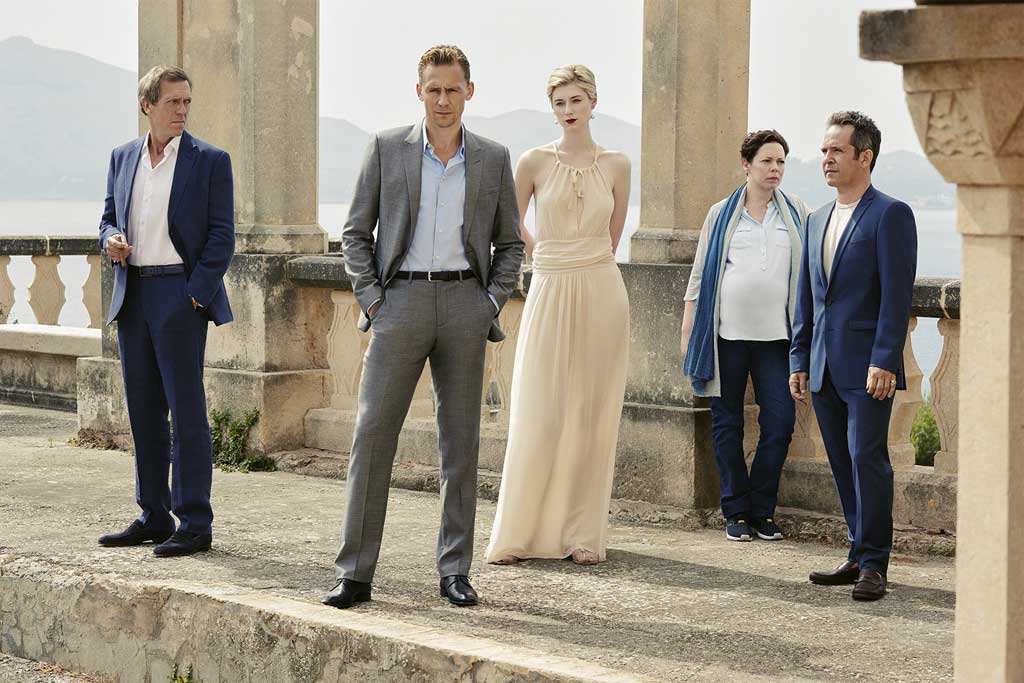By Kellie Freeze
John le Carré’s thrilling post-Cold War novel The Night Manager gets reimagined in an AMC and BBC coproduction that follows former British soldier Jonathan Pine (Tom Hiddleston) as he attempts to infiltrate the inner circle of an international arms dealer (Hugh Laurie) and exact revenge. But to gain the trust of “the worst man in the world,” and to earn a part among these linen-clad devils, Pine must himself become a criminal. “We’re now in a world where all our best TV shows and movies are about very morally ambiguous characters,” says executive producer Stephen Garrett. “[Tom] has to do some quite bad things for ultimately arguably good ends.” And the slow build as Pine’s plot for revenge unfolds is deliciously tense.
Director Susanne Bier helms the six-part series — premiering Tuesday April 19 on AMC — has several le Carré-approved changes to the plot. “The last two episodes are vastly different from the book,” she reveals. “What I aimed at was to keep the core of the novel, keep the sort of spirit of le Carré, but in order to do that, I don’t think you necessarily work it literally.” The Oscar winner adds, “It is quite a thorough rework, but to me, it really does have the true spirit of the novel.” One of the more significant changes was to the locales of the jet-setting tale. Hiddleston notes, “The Night Manager went to lots of places that aren’t often seen on film or television,” with filming locations that range from the Matterhorn to Mallorca to Morocco. But the biggest departure from the source material was to gender-swap Leonard Burr to Angela Burr, a brilliant move and played with frumpy transcendence by Olivia Colman.
There is something incredibly alluring and yet utterly terrifying about arms dealer Richard Onslow Roper, and Laurie adeptly embodies this cunning Machiavelli. Laurie shares that he was excited for the challenges the role presented, saying, “He is described in the story as the worst man in the world, which is a pretty exciting challenge to take on as a character to play, but a thrilling one, too.”
The mouse in this cat-and-mouse saga is Hiddleston, who plays Pine with pure perfection. “Le Carré describes him as a self-exiled creature of the night and a sailor without a destination,” the actor shares. Hiddleston is as comfortable in the stiff formality of a hotel employee (Pine’s post-military career) as he is as a manic butt-kicker. “There is a tension between a very calm exterior and a turbulent and chaotic interior,” says Hiddleston. “Susanne always encouraged me to lean into the tension between his obligation to be very, very calm and very passive on the surface while he’s actually on fire beneath.” The heat that he exudes is utterly smoldering, and while each actor is superb in his own scenes, when Laurie and Hiddleston share the screen, the results are eye-popping.
The entire series is permeated with brilliant performances from an all-around stellar cast. Roper’s companion is his devoted girlfriend, Jed (Elizabeth Debicki), whose untouchable sexuality and cool demeanor belie her rough upbringing and dark past. “I think Jed’s main attraction is sort of her instincts tell her that she can survive if she’s a part of his world,” says Debicki. “It’s very well-oiled and sort of smooth sailing once you’re a part of Roper’s world.” It’s no wonder that Debicki feels so comfortable portraying Jed in this Gatsbyesque microcosm — she played Jordan Baker in the 2013 film The Great Gatsby.
Tom Hollander is deliciously smarmy as Roper’s second in command, Major “Corky” Corkoran, who teeters between pathetic and psychotic, and who Hollander describes as “a kind of Oddjob, or older Krebs character, sort of the assistant of Blofeld or Dr. No.” He’s a nefarious sycophant who is reluctant to lose his place at the boss’ table, a perilous position that makes him both desperate and dangerous. Whether you think Corky’s just a fool serving his master, or a mini-mastermind himself, he’s fascinating to watch.
Laurie sums up the series’ appeal, and the appeal of le Carré in general. “There are causes that must be fought for and risked and sacrificed for, and there’s something immensely appealing and immensely romantic to me. I find this an incredibly romantic story, romantic without ever straying into the sentimental. That’s the miracle of the le Carré writing. I think of him as one of the most romantic of writers and one of the least sentimental.”
Brought to you by the publishers of TV Guide, the ultimate TV resource packed with celebrity news and commentary on what’s new and what’s good to watch. Get TV Guide at 88% off the cover price: call 800-866-1400 or visit tvguidemagazine.com. —©TV Guide 2016

